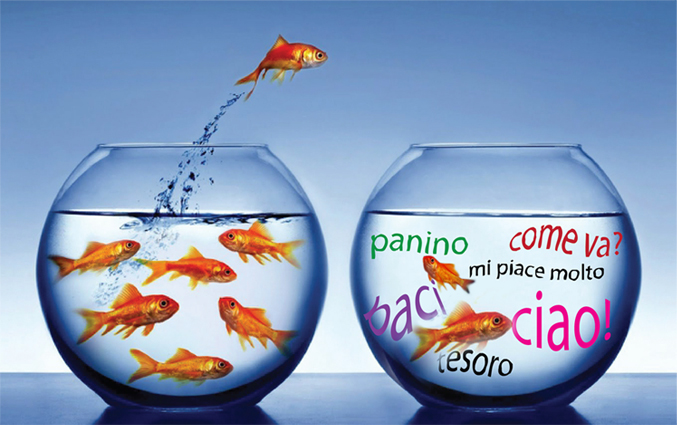From the Author:
Dear All,
The blog has been permanently moved to wordpress. I'm not going to publish anything on the blogspot address any more, and I'll delete the blog within a week or two.
So if you'd still like to follow my posts (I hope you do), please visit the wordpress version and click follow there: teflreflections.wordpress.com You can also find regular updates on the posts on the new blog's FB page by clicking here.
Thanks for reading and commenting on the posts here, and I hope to see you soon on wordpress.
Best,
Marek Kiczkowiak

I've gone quiet since my last post, but I haven't been completely idle. To the contrary.
I've become fascinated with polyglots and I've watched a couple of videos of different people who have learned a number of different languages, and have done so very quickly. By learning, I mean at least a strong B2 or weak C1 level, if we have to put a label on it. The three videos that have had the greatest impact on me are by Chris Lonsdale, Sid Efromovich and Benny Lewis.
All 3 of them come from different backgrounds, but they share one common thing: they've managed to learn various languages in a relatively quick time. For example, Chris became fluent in Chinese in 6 months and reached a native speaker level in 1 year. Sid got to a very advanced level in 3 languages in 3 years, whereas Benny is an absolute learning machine, and has learned a score of completely different languages, each in around 3 months.
I should make it clear right at the start, though, that I'm a sceptic - or perhaps a realist - and that all those fancy new-age, pseudo-scientific, pseudo-teaching miracle methods (e.g. hypnopaedia) have never really managed to convince me. So taking it all with a pinch of salt at the beginning, I started listening, and became completely hooked. If their stories are true - and I just can't see somebody lying so openly on a TED conference - then there's a lot we language learners and teachers could learn from them.
 Common knowledge, backed by most teachers, language school owners, friends, parents and our own experience of having abysmally failed to learn a language at school tells us that you need many years of diligent (classroom) work to become fluent in a language, if you're ever going to get there. Or that the best way is through immersion in the country were the language is spoken. We are also told that the older you get, the more difficult learning a language becomes. And that you can't get to a native speaker level after a certain age (forget what the age was). A lot of us also like to think that they don't have the talent, or that their memory is bad - probably deadens the disappointment of not speaking the language.
Common knowledge, backed by most teachers, language school owners, friends, parents and our own experience of having abysmally failed to learn a language at school tells us that you need many years of diligent (classroom) work to become fluent in a language, if you're ever going to get there. Or that the best way is through immersion in the country were the language is spoken. We are also told that the older you get, the more difficult learning a language becomes. And that you can't get to a native speaker level after a certain age (forget what the age was). A lot of us also like to think that they don't have the talent, or that their memory is bad - probably deadens the disappointment of not speaking the language.But what about people, such as Chris, Sid and Benny (and many others), who have indeed learned a language (to varying degrees of fluency) in a remarkably short time. To make it even more interesting, Chris and Benny were over twenty when they set off to finally learn a foreign language, and especially the latter must be a walking embodiment of "I don't have a flare for languages", as he puts it himself.
So I became really curious: Is it really possible for the average, talent-lacking Joe? Can I do it too? Can anyone do it?
I'm convinced that the answer is a resounding, triple: YES, YES, YES!
In this post, I'd like to first debunk some common misconceptions about language learning, which stop us from being effective learners. The most common excuses people make (based on Chris Lonsdale, Benny Lewis and my own teaching experience) for not being able to learn a language are:
You need talent and I haven't got it.
You don't. I believe that anyone can learn practically anything as long as they put their minds to it. You might just need to try a bit harder than the others, but it doesn't mean you can't. Just look at Benny Lewis - at 21 he miserably failed at learning Spanish while living in Spain, and couldn't speak a word of Irish Gaelic although he'd studied it for 10 years at school! He'd actually had problems learning English... Sounds familiar, doesn't it? Yet, he's now proficient in Spanish, German, French and communicative in a score of different languages, such as Czech, Gaelic and Arabic. If he could become fluent in a language, anyone can (no offence, Benny). Of course, talent might give you a slight advantage over the rest. A head start. But without hard work, talent will not get you far. And often it can just get in a way as a lame excuse for not trying harder.
Again, not entirely true. It's a common myth that children have this incredible flair for picking up languages, whereas adults struggle and fail. While it's true that a child raised in a multilingual environment will be probably proficient in all the languages it is exposed to, it's going to take the child at least 4 or 5 years before they achieve it. And when it comes to sending kids to language schools, well, I just don't think it changes anything. It took me exactly 10 years to reach C2 level in English, starting at the age of 7 (with classes both in a language and in a public school). But as an adult it took me less than 2 years to reach the same level in Spanish (and a lot of it on my own). Why? Because I studied hard. I was motivated. I used the language almost every day. It is also commonly believed that after a certain age you won't acquire native pronunciation. There are countless examples (myself included) that prove the contrary. Finally, an interesting study done at Haifa University suggests that adults can learn much faster than children if put under the right conditions. So no, you're never too old. So, no, you're never to old to give a new language a try. You've got to start young, and I'm too old now.
You've got to start young, and I'm too old now.I've got a bad memory.
Me too. Like a sieve. I never know where my keys are in the morning. I'm also reallybad at remembering names of people and places. Does this mean I can't learn new words? Of course not. Yet, for a long time I was horrible at it. I hated memorising new vocabulary (might sound strange from somebody who speaks 5 languages), until I discovered that I was going about it in a wrong way, trying to cram endless, boring, black-and-white lists of words and their definitions or translations. Fortunately, there are better and more fun ways of doing it. For example, psychologists specialising in memory suggest we link the new word to an image or sound - the more bizarre the better. For example:

It's not rocket science, is it? But believe me, it really does work. You not only memorise and retain the new words much faster, but you also have fun in the process.
For more tips, check out my post on Memrise and this article.


Thanks a lot for today's blog. Found it very informative and useful for I am a ESL teacher and can pass the info on to my students. I'll be waiting for the upcoming blogs. Once again thanks.
ReplyDeleteThanks for your comment, Willy. I hope the tips can help your students.
DeleteHI! if not mistaken, shoudn't it read"children have this incredible FLAIR for picking up languages"?
ReplyDeleteTrue! Thanks for spotting it. Just corrected it :)
DeleteWhy don't you write in a simple language so that everybody can understand better and guickly !!
ReplyDeleteSo it is fun for everybody!!
Thank you for your comment, Lootiyan.
DeleteI'm sorry that you found the language too difficult. I definitely didn't mean it to be convoluted. Would you like me to explain any sections to you?
Cheers